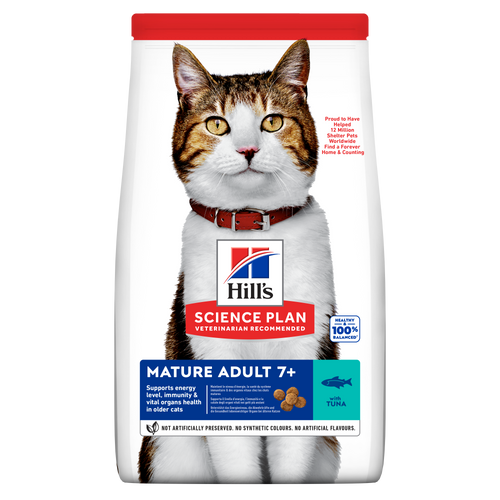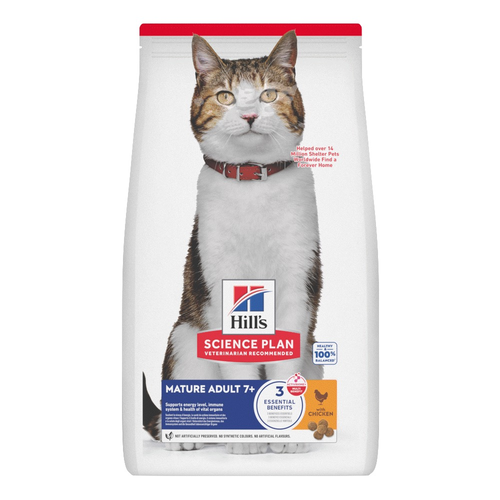
-
Featured products
 Small & Mini Puppy Food
Small & Mini Puppy FoodHill's Science Plan Puppy Small & Mini Breed Dog Food with Chicken is a complete pet food, specially formulated with ActivBiome+ Multi-Benefit Technology.
100% balanced nutrition to support optimal growth & the immune system.Shop Now Small & Mini Mature Adult Dog Food
Small & Mini Mature Adult Dog FoodHill's Science Plan Small & Mini Breed Mature Adult Dog Food with Chicken is a complete pet food, specially formulated with ActivBiome+ Multi-Benefit Technology.
Tailored nutrition to support graceful ageing in small dogs. Specially made with a synergistic blend of nutrients for energy & vigor.Shop Now Small & Mini Adult Dog Food
Small & Mini Adult Dog FoodHill's Science Plan Small & Mini Breed Adult Dog Food with Lamb & Rice is a complete pet food, specially formulated with ActivBiome+ Multi-Benefit Technology.
Tailored nutrition for the unique needs of small dogs during the prime of their life.Shop NowFeatured products Mature Adult 7+ Cat Food
Mature Adult 7+ Cat FoodHill's Science Plan Mature Adult Cat Food with Salmon is a complete pet food, specially formulated with ActivBiome+ Multi-Benefit Technology.
This food supports graceful aging in cats, providing a synergistic ingredient blend to help support energy & activity levels.Shop Now Mature Adult Cat Food
Mature Adult Cat FoodHill's Science Plan Mature Adult Cat Food with Chicken is a complete pet food, specially formulated with ActivBiome+ Multi-Benefit Technology.
This food supports graceful aging in cats, providing a synergistic ingredient blend to help support energy & activity levels.Shop Now Oral Care Adult Cat Food
Oral Care Adult Cat FoodHill's Science Plan Oral Care Adult Cat Food with Chicken contains clinically proven kibble technology to reduce plaque & tartar build up.
Shop Now -
Dog
- Dog Tips & Articles
-
Health Category
- Weight
- Food & Environmental Sensitivities
- Urinary
- Digestive
- Joint
- Kidney
Featured articles Proteins
ProteinsTo make a protein, amino acids are linked together in a long chain. The chain is then bundled into to a three-dimensional structure, like a tangled ball of yarn.
Read More The Right Diet For Your Pet
The Right Diet For Your PetIn people, the right diet is very important. If you are eating the wrong way for your metabolism, activity level, age and lifestyle you could end up with health issues.
Read More The Incredible Science Behind Your Pet's Microbiome
The Incredible Science Behind Your Pet's MicrobiomeLearn what your pet's microbiome is, how it contributes to your pet's gut and overall health, and why nutrition is important in maintaining healthy microbiomes.
Read More -


Puppies Aren't Born with Good Behaviour Built-In Your new puppy didn't come with good behaviour pre-installed. While the breeder may have introduced some initial toilet training, shaping your pet's behaviour is entirely up to you. The good news? Puppies are quick learners, so the sooner you start training, the better. By following some basic rules, you’re setting the stage for a rewarding relationship with your furry friend for years to come.
Always reward good behaviour
Whenever your puppy naturally exhibits good behaviour, make sure to reward them. Dogs of any age respond positively to rewards like praise, food, or both. When a puppy receives a reward, it reinforces that behaviour, making it more likely they'll repeat it in the future. Timing is crucial—the reward must be given within a few seconds, or your puppy might associate it with a different behaviour than the one you intended.


Tasty Tips
Preventing vs. Ignoring Bad Behaviour
The answer to managing bad behaviour? A little of both. Take chewing, for example. It’s something you should expect as part of your puppy’s natural exploration and teething process. Chewing can stem from boredom, teething discomfort, attention seeking, or even stress from being left alone.
Favourite objects to chew often include pillows, shoes, and furniture legs, so it’s important to teach your puppy what they can and cannot chew. Since they aren’t born with a “mustn't chew the kids' slippers" instinct, you'll need to guide them.
To prevent destructive chewing, deny access to areas where damage might occur and provide plenty of chew toys. When your puppy chews on their toys, offer lots of praise and let them enjoy the experience. What about chewing the wrong things? Ignore it. That’s right—no shouting, no smacking, no angry face. Simply pretend your puppy isn’t there, and they'll soon get the message that chewing on the wrong items doesn’t get attention.
When Ignoring Isn’t an Option
Of course, there will be times when ignoring bad behaviour could be dangerous. For instance, if your puppy tries to chew through a live electric cable, you need to intervene. In this case, a firm, sharp "No" is enough to break their focus. You don’t need to shout or scold—just get their attention. As soon as they stop and pay attention to you, reward them with praise and a treat to reinforce the positive behaviour.
Managing Barking Before It Becomes a Problem
Did you know that as puppies reach maturity at around 6 or 7 months, they begin to guard naturally? Owners who aren't aware of this often accidentally encourage excessive barking, which becomes difficult to control later.
To avoid this, don’t encourage your puppy to bark. This doesn’t mean they won’t react to serious threats—they will, naturally, without being taught. But preventing excitable barking is key. For example, if your puppy barks with excitement before a walk, simply stand still and ignore them. Once they quiet down, resume preparing for the walk. This teaches your puppy that calm behaviour gets rewarded, not loud barking.
By consistently rewarding good behaviour and managing unwanted actions with patience and understanding, you’ll help your puppy grow into a well - behaved and happy companion. With time, practice, and plenty of love, your bond will only grow stronger.


One of our staff authors prepared this article for you
Related products

Hill's Science Plan Puppy Small & Mini Breed Dog Food with Chicken is a complete pet food, specially formulated with ActivBiome+ Multi-Benefit Technology.
100% balanced nutrition to support optimal growth & the immune system.

Hill's Science Plan Small & Mini Breed Mature Adult Dog Food with Chicken is a complete pet food, specially formulated with ActivBiome+ Multi-Benefit Technology.
Tailored nutrition to support graceful ageing in small dogs. Specially made with a synergistic blend of nutrients for energy & vigor.

Hill's Science Plan Small & Mini Breed Adult Dog Food with Lamb & Rice is a complete pet food, specially formulated with ActivBiome+ Multi-Benefit Technology.
Tailored nutrition for the unique needs of small dogs during the prime of their life.

Hill's Science Plan Light Adult Small & Mini Breed Dog Food with Chicken is a complete pet food, specially formulated with ActivBiome+ Multi-Benefit Technology.
Helps keep your dog fit and active with our low calorie, great-tasting food.
Precise nutrition for less active adult small dogs that require a low calorie food to help maintain a healthy weight & lifestyle.
Related articles

Learn what you can feed your pregnant or nursing dog to keep her and her new pups healthy.

Learn how today's wet dog food blends have gotten a face lift, and how you'll provide your dog the nutrition he needs in the form he loves.

Learn more about the problem of dog obesity and more importantly, what you can do to help your dog avoid becoming overweight.

Learn about the symptoms, causes and treatments of dry puppy skin and how to provide relief for your dog. For expert skin care advice, visit Hill's Pet MT.

Put your dog on a diet without them knowing
Our low calorie formula helps you control your dog's weight. It's packed with high-quality protein for building lean muscles, and made with purposeful ingredients for a flavorful, nutritious meal. Clinically proven antioxidants, Vitamin C+E, help promote a healthy immune system.
Put your dog on a diet without them knowing
Our low calorie formula helps you control your dog's weight. It's packed with high-quality protein for building lean muscles, and made with purposeful ingredients for a flavorful, nutritious meal. Clinically proven antioxidants, Vitamin C+E, help promote a healthy immune system.

